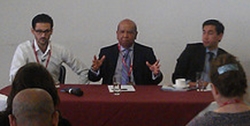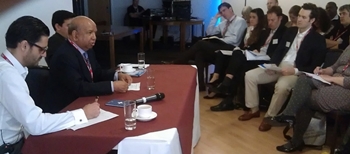The world’s economy is growing much faster than our ecosystem can support, argued Alejandro Litovsky at a breakfast meeting in London on 21 March to launch the March issue of Alliance magazine, which focuses on resilience investing. Water is running out, fish stocks are becoming depleted, forests are disappearing. What does this mean for philanthropists and impact investors, asked Litovsky.
This was the central question for the meeting, co-hosted by Alliance magazine, the Earth Security Initiative and the Social Investors Breakfast Club.
Litovsky and panellist Ben Caldecott of Climate Change Capital were in agreement that we need to use market mechanisms to encourage investment in resilience. The Earth Security Initiative argues that everything must be seen through three lenses: resilience of soil, water supply, and human rights – and investors must be encouraged to take these into account. They also agreed that investment in land is crucial to promote carbon retention, biodiversity and ecosystem services. But, said Caldecott, ‘this isn’t going to happen unless value is attached to all of these things, and so far the only meaningful progress we’ve made is with carbon. We need to do much more, especially on biodiversity and payments for ecosystem services.’ If we want to get money to flow into these areas and these agendas, clearly more needs to be done to create signals and incentives.
 On the positive side, investors can now get a return from doing something that is good for the environment, but this type of investment is still small-scale. One use of philanthropic capital could be to engage in these new markets to help accelerate their development (another could be to help shape regulation, eg feed-in tariffs, suggested one meeting participant), but the question remains: where will the capital come from? In some countries, such as Bangladesh and some African countries, there is a shortage of indigenous capital and/or an inability to access international capital at reasonable cost. Perpetuity funds are one vehicle for raising and deploying capital suggested by Climate Change Capital, as Caldecott outlines in his article for Alliance. These funds would be designed so that local governments and local communities have a strong stake in the success of each fund’s investments, which would properly align interests.
On the positive side, investors can now get a return from doing something that is good for the environment, but this type of investment is still small-scale. One use of philanthropic capital could be to engage in these new markets to help accelerate their development (another could be to help shape regulation, eg feed-in tariffs, suggested one meeting participant), but the question remains: where will the capital come from? In some countries, such as Bangladesh and some African countries, there is a shortage of indigenous capital and/or an inability to access international capital at reasonable cost. Perpetuity funds are one vehicle for raising and deploying capital suggested by Climate Change Capital, as Caldecott outlines in his article for Alliance. These funds would be designed so that local governments and local communities have a strong stake in the success of each fund’s investments, which would properly align interests.
But can we rely on prices and markets, eg incentives from government tariffs and financial returns, to solve the massive problems we face? The development of biofuels in order to reduce carbon emissions, often in response to government incentives, is already taking up much-needed agricultural land and threatening to compromise food security.
Major General Muniruzzaman of the Bangladesh Institute of Peace and Security Studies, also a panellist, was one of several at the meeting who stressed the need for a holistic approach, as he does in his interview for Alliance. He also emphasized the need for greater consultation with grassroots communities and stringent measures to deal with corruption. Money can create problems rather than solving them. ‘Conventional thinking is not sufficient for the problems we’re facing,’ he said. ‘This is not a problem of prices and markets, it’s a generational problem. The earth we inhabit does not belong to us; it belongs to our children, and we inhabit it on loan to them.’
Ben Caldecott agreed that capitalism ‘needs profound reform’. But in terms of scale, he said, the capitalist market system, if directed in the right way, is second to none. ‘We need to redirect it, not get rid of it. It’s a fundamental part of human society, so the idea that we can get rid of the "market" is completely wrong.’
 What is clear is the urgency of the problems to be tackled. ‘Bangladesh is the ground zero of climate change, the world’s laboratory,’ said Muniruzzaman. Desertification in many parts of the country is affecting livelihoods and undermining food security. Lack of access to clean water and consequent use of groundwater has led to arsenic poisoning in 73 million people, half the population. At the same time predicted rises in sea levels will result in the loss of 20 per cent of the country’s land area to the sea, creating a climate refugee population of 30-35 million – in response to which India has erected a 1,790-mile fence, the world’s longest, along its border with Bangladesh. Since 2000, Indian border guards have shot and killed 1,100 people approaching the fence, which is now being electrified. The repercussions of human displacement in Bangladesh will be felt in South Asia and internationally, said Muniruzzaman. ‘India needs to be convinced that our problems are interlinked, that we are in the same boat.’
What is clear is the urgency of the problems to be tackled. ‘Bangladesh is the ground zero of climate change, the world’s laboratory,’ said Muniruzzaman. Desertification in many parts of the country is affecting livelihoods and undermining food security. Lack of access to clean water and consequent use of groundwater has led to arsenic poisoning in 73 million people, half the population. At the same time predicted rises in sea levels will result in the loss of 20 per cent of the country’s land area to the sea, creating a climate refugee population of 30-35 million – in response to which India has erected a 1,790-mile fence, the world’s longest, along its border with Bangladesh. Since 2000, Indian border guards have shot and killed 1,100 people approaching the fence, which is now being electrified. The repercussions of human displacement in Bangladesh will be felt in South Asia and internationally, said Muniruzzaman. ‘India needs to be convinced that our problems are interlinked, that we are in the same boat.’
What about a perpetuity fund for Bangladesh, integrating governance, anti-corruption, and the interdependence of food, energy and water? This was a final positive suggestion thrown out as the meeting ended.





Comments (0)